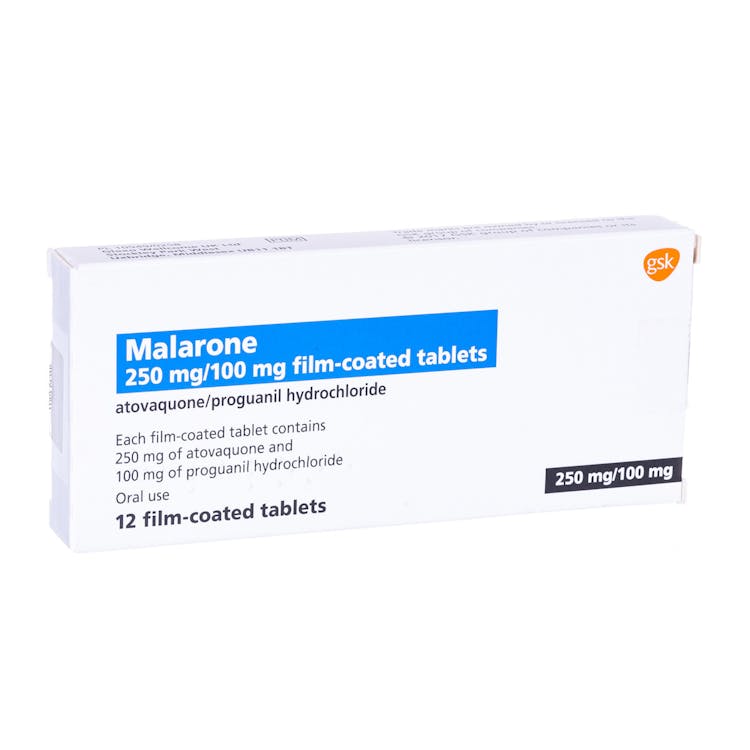Malarone
Bilder endast för illustrativa ändamål
Malarone is a medication used to both prevent and treat malaria. Malaria is a serious disease that is transmitted via mosquitoes in certain countries. Travellers to these areas, which include sub-Saharan Africa, South America, and many parts of Asia, are advised to take anti-malarial medication such as Malarone to prevent the illness occurring.
- Prevents and treats malaria
- Effective medicine
- Kills the parasite that causes the infection
- Genuine medication
- Shipped from EU Pharmacies
Mer information
What is Malarone?
Malarone Malaria Tablets
- Malarone contains two ingredients, atovaquone and proguanil
- Malarone works by killing P. falciparum, the parasite which causes malaria
- It is also important to protect yourself against mosquito bites by wearing DEET insect repellent, using nets to sleep under, and covering your skin at dusk and dawn
- It is important to read the patient leaflet for a full list of side effects and cautions.
How Does Malarone Work?
Malaria is a serious disease that can be fatal if left untreated. It is caused by a parasite that is carried by mosquitoes in certain parts of the world. If an infected mosquito bites you, the parasite (most commonly P. falciparum) can be transferred into your blood stream, infecting you with malaria.
Malarone works by killing P. falciparum. This means that even if you are bitten by an infected mosquito, you will be protected against malaria. When taken correctly, Malarone prevents around 95% of malaria infections.
As the protection is not 100%, it is also important to protect yourself against being bitten by mosquitoes even when you are taking an anti-malarial medication. This includes sleeping beneath a mosquito net, spraying DEET on exposed skin and clothing, using insecticides in your room and covering your skin with loose clothing.
Malarone is also sometimes used to treat someone who has developed a malaria infection.
How is Malarone Taken?
Malarone Tablets
Malarone is available in tablet form. The tablet should be swallowed whole with a drink of water, or for those who have difficulty swallowing tablets, it can be crushed and mixed in condensed milk just before taking it.
The tablet should be taken with a meal as it is less effective when taken on an empty stomach.
You should begin taking the Malarone tablets 1 to 2 days before you enter the area known to be affected by malaria. Treatment should continue throughout your stay, and then continue for a week (7 days) after returning home (or a week after entering an area not affected by malaria).
What is the proper dosage of Malarone?
Malarone Dosing
Each Malarone tablet contains 250mg of atovaquone and 100mg proguanil hydrochloride.
For prevention of malaria in adults, one tablet should be taken every day as directed above.
For treatment of malaria, four tablets are usually taken daily for at least three days.
The dosage of Malarone for children will vary depending on their weight.
Does Malarone have any side effects?
Malarone Side Effects
Like all medications, Malarone can have some side effects. The most common side effects include:
- Nausea and vomiting (feeling sick and being sick)
- Diarrhoea
- Abdominal pain
- Loss of appetite
- Weakness
- Headache
- Dizziness.
These side effects are likely to settle down, but if they persist or become troublesome you should speak to your doctor for further advice.
Rarely, more serious side effects can occur. If you experience any of the following you should speak to a doctor straight away.
- Signs of liver problems including yellowing of the whites of the eyes or the skin
- Signs of an infection such as a high temperature, cough, or feeling generally unwell
- Signs of anaemia including pale skin, feeling tired or breathless.
Serious allergic reactions happen very rarely. If you have a severe allergic reaction (anaphylaxis) including breathlessness, lip swelling or tongue swelling, call 999 immediately.
What warnings does Malarone come with?
Malarone may not be suitable for everyone. You should tell your prescriber if you:
- Have severe kidney disease
- Take medications for indigestion – you may need to change the time you take Malarone so that the medications don’t interact
- Take warfarin or another blood thinning medication – you may need to adjust your dose of warfarin and monitor your INR more regularly
- Are pregnant, trying to conceive, or breastfeeding - Malarone may not be suitable for you.
Some medications can interact with Malarone. You may be advised that Malarone will not suit you if you already take:
- Antacids or medications for indigestion
- Metoclopramide
- Another type of anti-malarial medication
- Blood thinning medications including warfarin
- Rifampicin or rifabutin
- Efavirenz
- Indinavir.
Buy Malarone
Buying Malarone Online
Can I buy Malarone online?
You can safely buy Malarone online at EU Meds. You will first need to have an online consultation with a pharmacist independent prescriber before your order will be supplied. The online consultation will ensure that Malarone is the right medication for your medical condition.
Do I need a prescription for Malarone?
Yes, in order to purchase Malarone you will need a valid prescription. Please note, all requests for supply of prescription medications are subject to an online clinical consultation and the decision to prescribe will be made by a doctor.

Här för att hjälpa dig
Our Customer Service is available Monday to Friday 9am - 4pm. If you need urgent assistance, do not use this service. Call 111, or in an emergency call 999. Visit our help section



